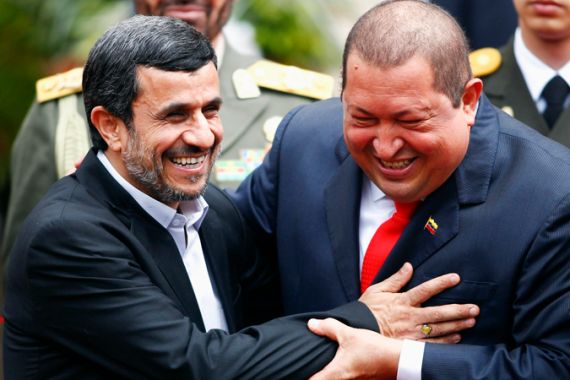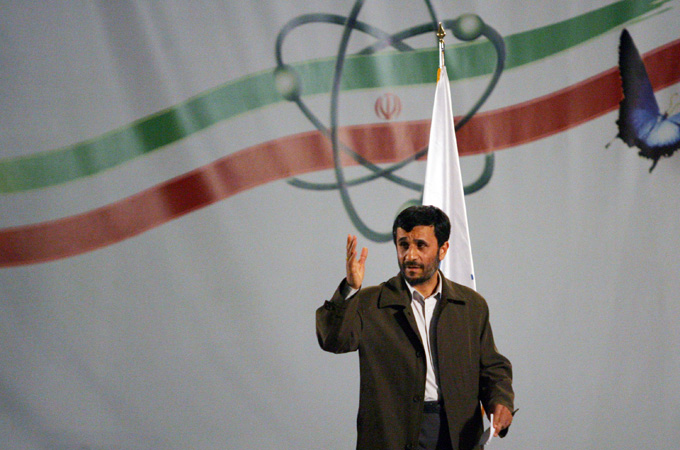Univision goes neoconservative
The Spanish-language TV network recently aired a saber-rattling report on Iran, focussing on its ties to Latin America.

 |
| Staunchly pro-Israel Univision owner Haim Saban has said ‘When I see Ahmadinejad, I see Hitler’ [GALLO/GETTY] |
Washington, DC – It’s not often that Univision, the leading Spanish-language television network in the United States, releases its content in languages other than Spanish. It is, after all, a Spanish-language television network. But earlier this month the broadcaster did something out of the ordinary, screening an English version of a recent report on Iran that’s received a rapturous reception from neoconservatives in Washington. And it at least appears to have done so at the behest of its hawkish new fan club.
Why would a network best known for sappy telenovelas shift to producing sloppy war propaganda – and English-language propaganda at that? Perhaps, as is usually the case with the corporate press, Univision’s bias and peculiar programming choices are best explained by simply noting who owns it: Israeli-American businessman Haim Saban, a self-described “one-issue guy” – that issue being Israel – who has been up front about purchasing media outlets to promote his own political views.
While those views are well-known if you look for them – hint: his public statements on Iran have invoked the Holocaust – they’re also not hard to gather from the right-wing-infused investigative reports Univision has been airing since he took over.
Originally broadcast in Spanish late last year, the ever-so-subtly titled report that’s driving the neoconservative community wild – “La Amenaza Iraní”, or “The Iranian Threat” – received an unusual February 8 screening, in English, at the neoconservative Hudson Institute, a Washington think tank that counts former Vice President Dick Cheney’s chief of staff, convicted felon Lewis “Scooter” Libby, as one of its top scholars. Focussed on Iran’s relations with Latin America, the hour-long piece regurgitates all the pro-war right’s by now familiar talking points about nefarious Islamists acting in concert with leftist Bolivarians to bring Terror to the US’ doorstep, complete with all the ominous music and images of swarthy foreigners one would expect from a Hollywood movie or a corporate news report.
“Iran is looking for all the support that it can get to fight back against its fiercest enemies, Israel and the United States,” declares reporter Vytenis Didziulis in the opening minute of the piece. “Latin America, because of its geographical and cultural proximity, may present the most direct way for Iran to challenge – or even attack – the US.”
What follows is a string of allegations about Iran’s dealings with Venezuela, Cuba, Nicaragua and other Latin American countries notable mostly for how little there is to them. A former Ecuadorian intelligence official, for instance, fired by President Rafael Correa for insubordination amid charges that he was a CIA asset, is given time to claim – without so much as an incriminating Word file – that his former boss is “sending intelligence agents to secret Iranian training facilities” in South America. Viewers are also presented with the information that the Venezuelan military, as part of efforts to prepare for a feared US invasion back in 2005, reportedly distributed a manual on asymmetric warfare written based on the tactics employed by the Lebanese group Hezbollah – tactics the US military has itself studied.
|
“Such are the network’s standards that, beyond the idle speculation, assertions capable of being debunked with no more than 30 spare seconds and an Internet connection are presented as fact.” |
The “exclusive!” meat of the report is video footage from 2007 purporting to show the Iranian ambassador to Mexico at the time, Mohammad Hassan Ghadiri, discussing a plot to launch cyber-attacks against the US government with a group of Mexican college students who were posing as hackers. Nowhere in the footage, though, is there any evidence to dispute Ghadiri’s claim he was merely entertaining a group of kids he suspected, not without cause, were actually CIA agents.
During a panel discussion following the screening, Didziulis – seemingly unconcerned with what an appearance at a far-right think tank would say about the objectivity of his reporting – acknowledged that his network was the only one to run with the story; every other media outlet that received the footage declined to run it. Such are Univision’s standards.
False assertions
And such are the network’s standards that, beyond the idle speculation, assertions capable of being debunked with no more than 30 spare seconds and an Internet connection are presented as fact. Univision news anchor María Elena Salinas, for instance, states in the programme that, “In November of 2011, the International Atomic Energy Agency indicated that Iran is in fact developing a nuclear weapon as part of a covert military operation.”
The agency’s actual report, of course, declares no such thing, instead noting “concerns” about “possible” military dimensions to Iran’s declared, civilian nuclear energy programme while nevertheless unambiguously stating that it “continues to verify the non-diversion of declared nuclear material” in the country.
But the report is not without its moments. Those who appreciate dark, funny-if-these-people-didn’t-have-power comedy will appreciate the segment where Salinas presents the head of the House Foreign Affairs Committee, far-right Florida Republican Ileana Ros-Lehtinen, as an authoritative expert on Latin America. And they’ll laugh out loud when the congresswoman’s efforts to stir the American public into a jingoistic rage ends with her suggesting, amazingly, that Iran just may well bomb the very countries she regularly accuses of being in Tehran’s pocket.
“Are we going to wait for a bomb to explode in Buenos Aires again? Or in Managua? Or in La Paz?” Ros-Lehtinen says in Spanish, the last two cities being the capitals of Nicaragua and Bolivia, which Iranian President Mahmoud Ahmadenijad just visited on a diplomatic trip she herself dubbed a “tour of tyrants” during a recent congressional hearing.
But consistency, facts – they are silly, tiresome things. And they are of little import in Washington, where scary portrayals of messianic Muslims armed with WMDs have long trumped boringly rational assessments of the world. And those attending the Hudson Institute screener, certainly, were clearly ecstatic to hear their own factually challenged rhetoric rebroadcast under the auspices of objective journalism.
“If there are still scholars, journalists and policymakers who remain skeptical, Univision’s extraordinary documentary should erase all doubt,” declared Hudson’s Jaime Daremblum, the US ambassador to Costa Rica under George W Bush who is on record declaring Iran’s dealings with the likes of Venezuela, Cuba and Nicaragua stem from a “messianic” desire to attack the United States and its interests. The report, Daremblum said, “persuasively shows that Iranian activities represent a major threat to hemispheric security”.
Douglas Farah, a terrorism “expert” who once claimed that the Muslim Brotherhood had “made tremendous strides in occupying positions of influence within the Obama administration”, was equally gushing in his praise for the report, to which he and a host of other usual suspects on the right contributed. During the panel discussion following the screening, he explained he was so impressed with the original Spanish-language report that he lobbied for an English version to present to Washington’s policymakers.
“When I saw the final product, I thought it was important to bring that to a broader audience,” said Farah. “The Univision audience is largely the Latin American community, and in Spanish, and it was not as broadly circulated in Washington policy circles as I felt it should be. And so I approached Jaime about the possibility of hosting something here.”
Neither Farah, the Hudson Institute nor Univision responded to several requests for comment. But then, you don’t really need a comment from a spokesperson to understand what’s going on here.
Saban’s role
In 2006, Univision was purchased for $1.1bn by a group of investors led by Saban, who now serves as its chairman. One of the wealthiest men in the US, Saban is a major donor to the Democratic Party who, according to a Fortune magazine profile, regularly “gossips with Rupert Murdoch, vacations with Bill Clinton … and confers with former Israeli Prime Minister Shimon Peres.”
As journalist Belén Fernández notes, Saban’s political views tend to mirror those of his hawkish establishment friends. And when it comes to perceived threats to Israel, he’s about as subtle as the reports his media properties produce.
“When I see Ahmadinejad, I see Hitler,” Saban said of the Iranian president the same year he purchased Univision. “His motivation is also clear: the return of the Mahdi is a supreme goal … [and] worth the liquidation of five and a half million Jews. We cannot allow ourselves that.”
This past December, meanwhile, Saban hosted a “Friends of the Israel Defence Forces” fundraiser that, according to the Jewish Journal, was “teeming with Los Angeles’ most hawkish, hard-line lovers of Israel”. And, lest anyone think he separates his personal views from his businesses, at a 2009 conference in Israel he outlined “three ways to be influential in American politics,” which according to New Yorker magazine consist of “mak[ing] donations to political parties, establish[ing] think tanks, and control[ing] media outlets.”
And in “targeting media properties”, the New Yorker noted, “Saban frankly concedes his political agenda, as evidenced by his repeated efforts to purchase the Los Angeles Times.”
“I thought it was time that it turn from a pro-Palestinian paper into a balanced paper,” Saban said when asked to explain his interest in the paper.
But as the fifth-largest television network in the US, with a rapidly growing audience among 18-49 year olds, Univision reaches a much bigger audience than the Times. And it provides a much larger platform from which to promote a hawkish line on Israel’s perceived foes, particularly to the under-propagandised and rapidly growing Hispanic market – a market of roughly 50 million that one Zionist organization, The Israel Project, recently labelled the world’s “most hostile towards Israel.”
With the network reportedly in talks with the Walt Disney Company to launch an English-language cable news channel, Univision’s dishonest – and strangely English – documentary on the “Iranian threat” may just be an example of what’s to come. At a minimum, it suggests yet again that when it comes to corporate news, objective facts and evidence are less important than who’s paying to keep the lights on.
Charles Davis is an activist and writer who splits his time between Washington, DC, and Nicaragua. He is a contributor to the newswire Inter Press Service and his work has aired on public radio stations across the United States. To read more of his work, visit his website.
Follow Charles on Twitter: @charlesdavis84
